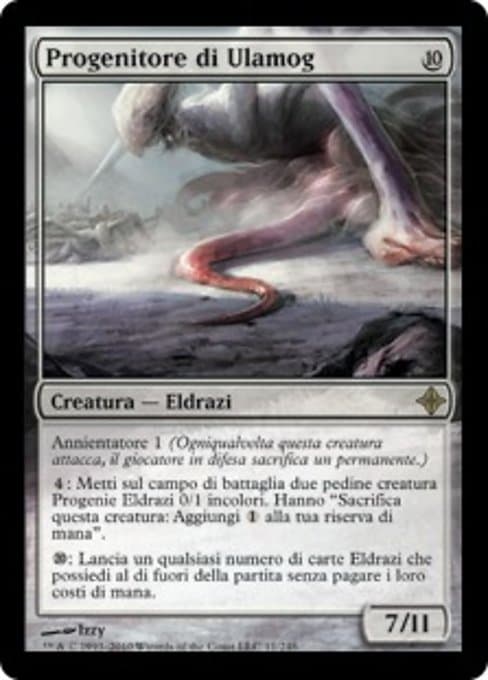
Progenitore di Ulamog
Creatura — Eldrazi
Annientatore 1 (Ogniqualvolta questa creatura attacca, il giocatore in difesa sacrifica un permanente.) : Metti sul campo di battaglia due pedine creatura Progenie Eldrazi 0/1 incolori. Hanno "Sacrifica questa creatura: Aggiungi alla tua riserva di mana". : Lancia un qualsiasi numero di carte Eldrazi che possiedi al di fuori della partita senza pagare i loro costi di mana.
7 / 11
Illustrated by Izzy
· Rise of the Eldrazi (ROE)
Spawnsire of Ulamog
#11 · Rare · Italian · Nonfoil/Foil
Legal Formats
| Standard |
| Pioneer |
| Modern |
| Legacy |
| Vintage |
| Commander |
| Oathbreaker |
| Alchemy |
| Explorer |
| Historic |
| Timeless |
| Brawl |
| Pauper |
| Penny |
Variants
Under Construction
Prints
Rulings
2010-06-15 : Annihilator abilities trigger and resolve during the declare attackers step. The defending player chooses and sacrifices the required number of permanents before they declare blockers. Any creatures sacrificed this way won’t be able to block.
2010-06-15 : If a creature with annihilator is attacking a planeswalker, and the defending player chooses to sacrifice that planeswalker, the attacking creature continues to attack. It may be blocked. If it isn’t blocked, it simply won’t deal combat damage to anything.
2010-06-15 : If you cast a card “without paying its mana cost,” you can’t pay any alternative costs. On the other hand, if the card has additional costs, you may pay those.
2010-06-15 : In a casual game, the cards you cast from outside the game come from your personal collection. In a sanctioned event, those cards must come from your sideboard. Note that you can’t cast cards from exile this way; exile is a zone in the game.
2010-06-15 : You cast Eldrazi cards from outside the game as part of the resolution of Spawnsire of Ulamog’s last ability. You may cast those cards in any order. Timing restrictions based on the card’s type (such as creature or sorcery) are ignored. Other restrictions are not (such as the one from Rule of Law). You cast all of the cards you like, putting them onto the stack, then the ability finishes resolving. The spells you cast this way will then resolve as normal, one at a time, in the opposite order that they were put on the stack. They’ll remain in the game for the remainder of that game.
Comments
Under Construction